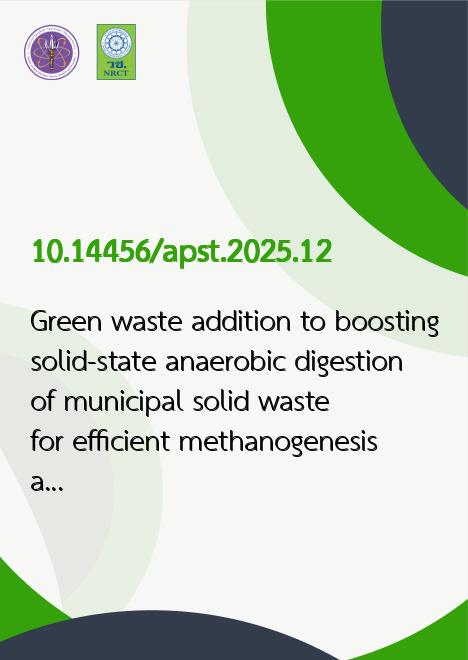
|
Green waste addition to boosting solid-state anaerobic digestion of municipal solid waste for efficient methanogenesis and energy recovery |
|---|---|
| รหัสดีโอไอ | |
| Creator | Wattananarong Markphan |
| Title | Green waste addition to boosting solid-state anaerobic digestion of municipal solid waste for efficient methanogenesis and energy recovery |
| Contributor | Peerawat Khongkliang, Wantanasak Suksong, Wisarut Tukanghan, Chonticha Mamimin |
| Publisher | Asia-Pacific Journal of Science and Technology |
| Publication Year | 2568 |
| Journal Title | Asia-Pacific Journal of Science and Technology |
| Journal Vol. | 30 |
| Journal No. | 1 |
| Page no. | 12 (11 pages) |
| Keyword | Organic fraction municipal solid waste, Green waste, Co-digestion, Methane production, Microbial community |
| URL Website | https://so01.tci-thaijo.org/index.php/APST/ |
| Website title | https://so01.tci-thaijo.org/index.php/APST/article/view/270436 |
| ISSN | 2539-6293 |
| Abstract | Biogas production from the organic fraction of municipal solid waste (OFMSW) is often hindered by the risk of acidic failure at high loadings due to its readily biodegradable nature. This study explored the potential of enhancing methane production through the co-digestion of OFMSW with green waste (GW) in anaerobic fermentation. By evaluating the impact of the carbon-to-nitrogen (C/N) ratio on digestion efficiency, we compared the performance of individual and co-digestion processes. The results demonstrated that co-digestion significantly outperformed individual digestion, achieving a maximum methane yield of 420 L/kgVS with an optimal OFMSW ratio of 2:1. At 10% total solids (TS) loading, this ratio led to a 72% improvement in mass and energy balance compared to the digestion of OFMSW or GW alone. Microbial community analysis revealed that Clostridium sp. was the dominant bacterium in the co-digestion process, while Methanobacterium sp. was the predominant archaea, both playing crucial roles in methane production. The co-digestion of the readily biodegradable OFMSW with the more slowly degradable GW proved to be an effective strategy for enhancing methane yield and energy recovery. These findings indicate the viability of co-digestion as a robust approach for optimizing methane production and advancing sustainable waste management and renewable energy generation. |
